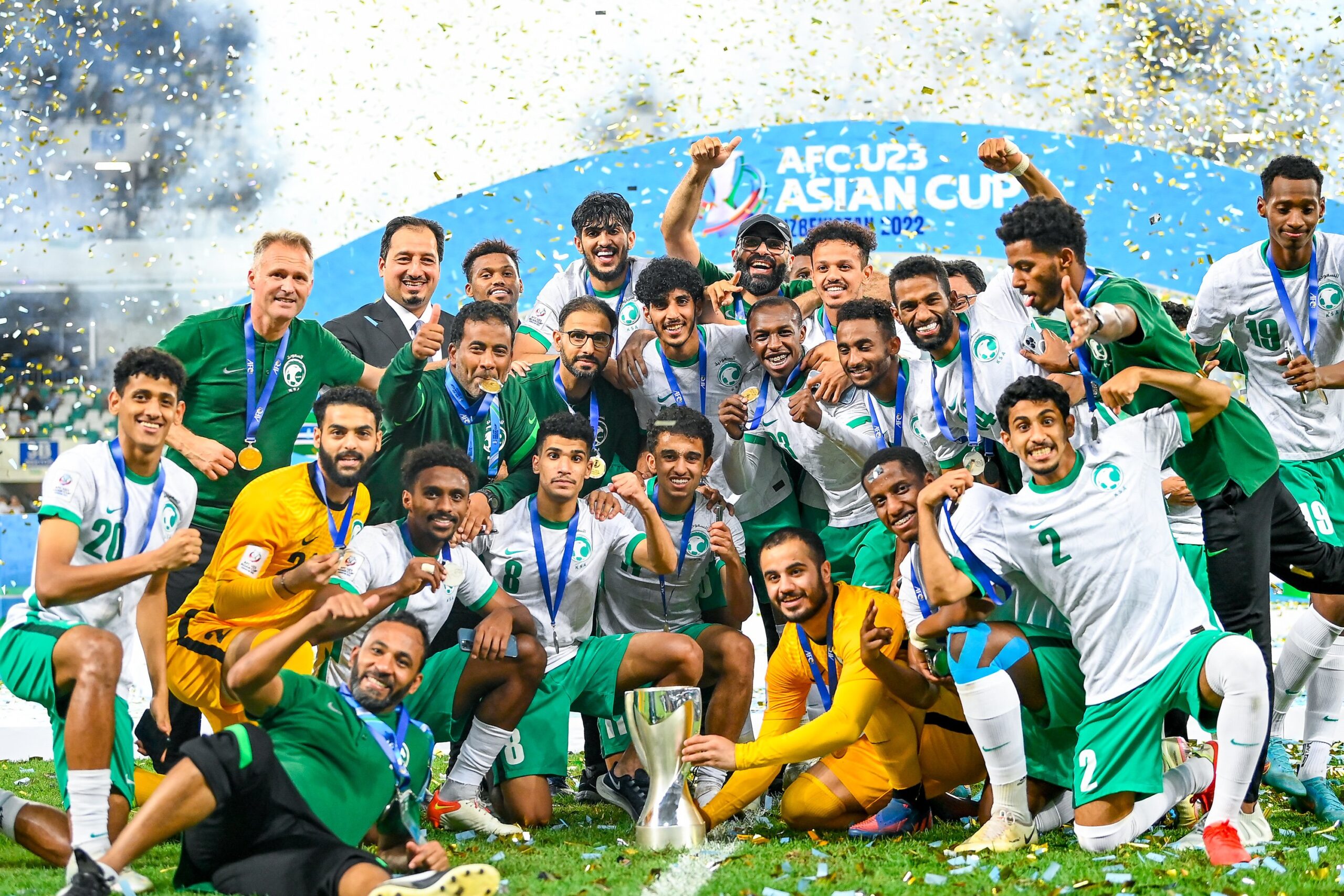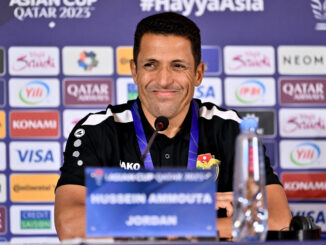
Saudi Arabia were crowned U23 AFC Asian Cup champions for the first time this weekend, following an ultimately comprehensive 2-0 victory over hosts Uzbekistan at Milliy Stadium in Tashkent, following 32 matches squeezed into under 20 days’ worth of enjoyable competition.
Firas Al-Buraikan’s fine finish past stand-in keeper Vladimir Nazarov, doubled their second half lead granted to them by another exquisite strike from Ahmed Al-Ghamdi. Saudi Arabia not only cruised their way to gold medal success in the final, but did so having not conceded a single goal across the whole tournament; a feat unmatched in previous editions.
For coach Saad Al-Shehri, it’s a second successive final appearance; this time lifting silverware, having lost out to South Korea two years ago. The change? A greater maturity. A growing acceptance of Saudi football’s significant presence at the top table of Asian football.
Several players are set to build their careers off the back of significant performances in Uzbekistan. Golden ball winner Ayman Yahya was a creative threat throughout, Moteb Al-Harbi possesses all the hallmarks of a modern attacking left back, while centre back Saud Abdulhamid will rightly laud his influence in an unmatched clean sheet record for years to come.
Arguably the tipping point, however, came through the inclusion of centre back Hassan Tambakti and striker Firas Al-Buraikan – two players whom for the first two weeks of the tournament were with the seniors, as they started their build up to the World Cup in Qatar under Herve Renard. Their return to the U23s at the knockout stage wasn’t added fluff; with Tambakti returning to accept captaincy, further solidifying an already rock solid back four, and Al-Buraikan adding that much needed cutting edge that was probably missing during the group stage.
The hosts with the most, but a tournament with its question marks
While Saudi football was on form, at the pinnacle of its game, the event wasn’t without its detractors. Was this the best advertisement of Asian youth football? Probably not. Two of the top three teams opted to send U21 squads, as preparation for the next U23s in two years’ time which will simultaneously run as a qualification round for the 2024 Paris Olympics.
Most of the squads missed at least one or two of their best players, who were on duty with their respective senior teams while similar problems were experienced with the officials; a strange mix of senior AFC referees and relative newcomers which at times made for an erratic cocktail.
The match intensity and drama probably was dialled down as a result; not by lack of quality of the finalists but some significant tactical failures, and a mixture of mitigations to the personnel on show. For the hosts, however, there were only positives to take out of their organising of the tournament. Having stepped into China’s breach less than two years ago, Uzbekistan complete the tournament on a high.
On the pitch, their young team demonstrated a positive forward-thinking direction of football. Led by an attack focused Timur Kapadze, this U21 cohort of players has time to not only match but exceed the achievements of the cohort of four years ago which were crowned U23 champions.
Poster boy for the tournament Jasurbek Jaloliddinov lived up the billing as inspirational captain and mercurial playmaker. Pakhtakor’s Khojimot Erkinov only underlined his potential with a number of eye-catching displays, as did centre forward Khysayin Norchaev.
The support followed the team, selling out each Uzbekistan match, and creating a tournament-worthy buzz that will have hopefully been noticed by the AFC when it comes round to future hosting bids. The caveat came unfortunately in the quarter-finals, as an early red card to keeper Abduvohid Nermatov was met with hostility and projectiles from the crowd, that meant for an unsavoury delay and a one-match attendance ban for their resulting semi-final.
In truth the officiating in general had a bumpy ride. Twelve red cards over the course of the tournament was a significant rise on previous editions, and while the majority warranted action, for petulance more than overt aggression, refereeing decisions, hindered in most cases by a VAR system which took me back to the early pilot days of delay and misinterpretation, sadly took centre stage more often than not. But for two wonderous strikes from Saudi Arabia; the final at times felt more like VAR’s moment in the blistering Tashkent sunshine than anything else.
Established nations falter
While Uzbekistan succeeded despite limiting itself to their U21 team, the same restrictions ultimately didn’t carry for traditional heavyweights Japan, a description more aptly considered for the seniors at the moment, given their struggles at this level of youth football. A third-place finish, considering back-to-back weak tournaments, is an improvement, but for many Samurai Blue fans this was a tepid disappointment, especially the manner of their semi-final defeat to the hosts.
There were high points. Joel Fujita controlled the middle of the park without breaking a sweat through the tournament; there were also glimpses of the immense talent possessed by 17-year-old centre back Anrie Chase, while Yuito Suzuki replicated his J1 goalscoring form joining a five strong tie for the golden boot.
Their non-fuss approach, that received such rave reviews against South Korea, and in their third placed playoff win over Australia ultimately proved their undoing against Uzbekistan; too placid to reinvent and mix it with a team that demonstrated a greater intensity and appetite.
They signed off their campaign with a victory over an Australia side who shone defensively, but struggled in attacking areas, a similar trait that also hampered them reaching the final in 2020; eventually falling to Saudi Arabia in the semi-finals – arguably the first class act they had faced – but admittedly not helped by a soft early red card to centre back Jay Rich-Baghhuelou. While ultimately falling flat, Alou Kuol’s memorable scorpion kick against Iraq in the group stage will stay etched in many a viewer’s mind for years to come.
South Korea similarly struggled, guided by under-fire coach Hwang Sun-hong, who’s sometimes over tinkering of the line up – often leaving pre-tournament headline trio Lee Kang-in, Cho Young-wook and Oh Se-hun on the bench – led to more questions than plaudits. While their group stage was a relative breeze, a 3-0 reverse to their biggest rivals in Japan will hurt, exiting prematurely in the quarters in what was meant to be their retention bid.
The likes of Qatar and Iran, who many fancied to go further pre-tournament, also collapsed under expectation. An ever-reducing stock of young talent looks to be slowly evaporating for Qatar, with back-to-back group stage exits now leaving them with some thinking to do. While Iran lacked a real clinical touch in attacking areas, ultimately some bad decisions from the officials cut short their journey at the group stage.
Promising signs from the fringes
There was more to celebrate from the less fancied nations. Turkmenistan, making their debut in the competition, qualified from a group consisting of the hosts, Qatar and Iran; having engineered comebacks against the latter two to make for a dramatic last ditch progression. The heroics of keeper Rasul Charyyev, who did the same for his club side Ahal in his AFC Champions League debut only a couple of months ago, went as far as the quarters, before falling at the hands of Australia.
There was promise from the likes of Iraq and Jordan; both under new young coaches in Miroslav Soukup and Ahmed Hayel respectively, adopting approaches that found fortune and admirers at the tournament. Soukup’s Iraqi side were one of the more exciting teams for neutral fans. Passionate and committed, in particular their magical number 10 Hasan Abdulkareem and deep playmaker-cum-defensive enforcer Muntadher Mohammed.
There was no significant bounce, however, following the regional SEA Games that took place last month for the Southeast Asian trio of Vietnam, Thailand and Malaysia. Vietnam succeeded over its rivals, to join South Korea in the knockouts, but realistically they lacked the same hallmarks of intensity and unity, lost by not having senior coach Park Hang-seo in dugout behind them.
Near capitulations for debutants Tajikistan, stripped of much of their talent by their ultimate history making seniors in the concurrent Asian Cup qualification campaign, UAE, who continue to head backwards, and Kuwait, who mustered only sporadic impact on the tournament, rounds up a host of interesting snippets that greeted broadly mundane efforts in the group stage.
While 2022 was rarely ever going to be remembered for its staging of the U23 Asian Cup; the hosting and potential reframing of Uzbek football makes for a successful youth competition that will be remembered fondly moving forward.
As for the champions, Saudi Arabia underlined their presence on the Asian stage. While some may still assume their threat as one of a noisy neighbour, the talent at their disposal is clearly rising in stock. Next up for them, a worldwide showing at November’s World Cup.
Photo: Saudi Arabian Football Federation
Listen to Episode 86 of The Asian Game podcast with Martin Lowe and Rhysh Roshan Rai




